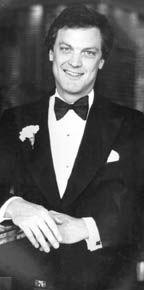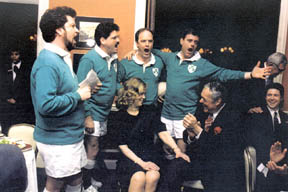|
Web Exclusives: Alumni Spotlight Posted November 6, 2002: Doctor
by day, musician at night
"I've used music as an outlet," Dr. Bunning reveals, to balance his day job as rheumatologist at National Rehabilitation Hospital, recently ranked among the best in the country for arthritis patients by U.S. News & World Report. "Working at a rehabilitation hospital has taught me the importance of leisure skills." Princetonians of a certain age may remember Bunning's band, Harbour Lights, which the music major formed in his junior year. Bunning was the pianist, and Alex Donner '75, who went on to a singing career (and performed at Princeton Stadium's opening ceremonies), crooned Sinatra-style. "It was a scaled-down Lester Lannon model," Bunning says. "We played for fraternities, homecoming parties — we were affordable." And in demand — the band's profits helped Bunning pay his way through Princeton. The Princeton experience also taught Bunning he had a gift for gathering musicians — which came in handy during medical school when he revived Harbour Lights at the University of Cincinnati. Bunning led a cadre of medical students who played a Dixieland format and even cut an album. "I don't think I could have gotten through med school without music," Bunning says, "Medicine is demanding, draining. With music you let loose." It wasn't until he was making the rounds officially as a doctor that Bunning discovered the joys of singing. The CEO of the newly opened National Rehabilitation Hospital had been part of a barbershop quartet at a Chicago rehab center, and drafted Bunning, a baritone, to launch a group in D.C. with hospital personnel. The group appeared for five years at hospital functions to boost employee morale. "It was a good model of harmony and working together," Bunning remembers. Bunning enjoyed the experience — and the fact that singers travel light, as opposed to lugging musical instruments to gigs. But it wasn't until a St. Patrick's Day some 10 years ago that the idea for The Brothers Flanagan was born. Seeing lines outside a popular Irish bar that day gave Bunning an idea. The next year he called three bar owners and suggested they allow a quartet to bypass the lines and sing three songs to entertain their patrons. Gigs established, Bunning set out to find singers to join him. Now The Brothers Flanagan don Irish rugby shirts and make the rounds on a regular basis. It was a Valentine's Day gift of studio time from Bunning's wife that led to the group's recent CD. "Danny Boy," "When Irish Eyes Are Smiling," and other Irish-American favorites are recorded, along with a blarney-filled tale of how the group came to be. By Maria LoBiondo Maria LoBiondo is a frequent contributor to PAW.
|

 None
of them are named Flanagan, nor are they brothers. The singing foursome's
founder, Robert Bunning '75, is only half Irish. But The Brothers
Flanagan, a male quartet Bunning's led for 10 years in the Washington,
D.C. area, has just recorded its own CD. The four make the rounds
on St. Patrick's Day and wherever invited throughout the year, bringing
cheer to listeners and for Bunning, a sense of equilibrium.
None
of them are named Flanagan, nor are they brothers. The singing foursome's
founder, Robert Bunning '75, is only half Irish. But The Brothers
Flanagan, a male quartet Bunning's led for 10 years in the Washington,
D.C. area, has just recorded its own CD. The four make the rounds
on St. Patrick's Day and wherever invited throughout the year, bringing
cheer to listeners and for Bunning, a sense of equilibrium.
 For
Bunning, the yin and yang of music and medicine continue to be a
life-affirming combination. Now, he says, if his son turns out to
be a tenor, he may launch his family into a singing group, too
For
Bunning, the yin and yang of music and medicine continue to be a
life-affirming combination. Now, he says, if his son turns out to
be a tenor, he may launch his family into a singing group, too